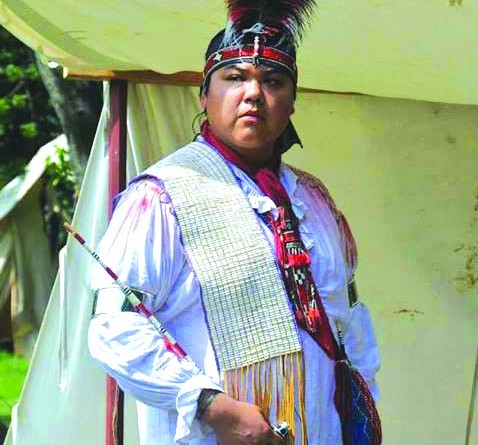Colloquium celebrates Native American culture, activism
By: Rachel Cain – News Editor
In commemoration of Native American Heritage Month, which occurs every November, UD hosted its 14th annual Native People of the Americas Colloquium Nov. 1-2. The theme of this year’s colloquium was “Indigenous Identity, Native Activism and Colonial Legacies.”
“We started this [the NPAC] back in 2001 because they talk about diversity at UD…but you never hear the voices or see the faces of Native people,” said Mary Ann Angel, Ph.D., at the opening event. Angel, who discovered several years ago that her grandmother was a Cherokee, is a communication professor and member of the NPAC committee.
Angel emphasized that Native Americans should have the opportunity to speak about their cultures, as historically non-Native individuals have attempted to define what it is to be Native American and thereby overshadowed true Native American culture.
“The event gives voice to various aspects of Native American experience,” explained Tereza Szeghi, Ph.D., an English professor and co-chair of the NPAC committee. “We celebrate Native cultures by giving voice to a range of Native perspectives.”
The colloquium kicked off Nov. 1 with a Native American flag song performance followed by a description of the Iroquois tradition that led to modern-day lacrosse.
Following the presentation, members of the UD men’s club lacrosse team and a local Make-a-Wish youth lacrosse team joined for an instructional clinic and exhibition game.
Jamie Jacobs, the lacrosse presenter and member of the Tonawanda Seneca tribe, told Flyer News that he “travels all over the place” to educate audiences about Native American culture. He has visited UD multiple times to participate in a traditional dance performance.
He explained that many people receive most of their notions about Native Americans from the media, which often relies on stereotyping. Jacobs’s goal during his demonstrations is to “bridge the gap” between “what the public knows, what they don’t know.”
He mentioned that stereotyping of Native Americans is partially due to the failure of schools to discuss their history.
“If the history books say anything, it’s just that the Iroquois Confederacy exists and there are the six tribes in it,” he said.
The University of Dayton’s NPAC also examined present-day matters pertaining to Native American culture.
“[The colloquium] is not just about history, it’s also about current issues,” Angel said.
The Native People of the Americas Colloquium examined subjects including climate change, the 2010 World Lacrosse Championship Iroquois controversy and the canonization of Junipero Serra by Pope Francis in September.
“There is much more to Native American history than colonization, including their pre-colonial histories, cultures, traditions, art, etc. that also is under-represented in the mainstream U.S.,” Szeghi elaborated. “It is important to give voice to the full range of Native experiences as part of our recognition of all members of our country.”
There is much more to Native American history than colonization, including their pre-colonial histories, cultures, traditions, art, etc. that also is under-represented in the mainstream U.S.”
The colloquium continued Nov. 2 with events on topics ranging from the Indigenous people of Ohio to the relationships between Native Americans and Catholics.
Music and story-telling took place between sessions in the Kennedy Union Torch Lounge.
Deborah Miranda, the keynote speaker, presented at the Kennedy Union Ballroom the evening of Nov. 2. Her keynote address was titled, “‘Even when we’re dead we aren’t good enough’: Bad Indians and the Legacy of Junipero Serra.”
Miranda discussed the problematic aspects of Pope Francis’s recent canonization of Junipero Serra, who historians agree forced Native Americans to convert to Christianity and had them whipped, imprisoned and sometimes worked or tortured to death.
However, Miranda also believes California Indians can “strategically exploit” the canonization for their benefit.
“Miranda argues that Pope Francis’s canonization of mission founder Junipero Serra ironically places California Indians into an unprecedented spotlight, as they protest the canonization and speak out about the genocidal effects of the missions and the intergenerational trauma their survivors have faced,” according to the Office of Multicultural Affairs Web page about the colloquium.
Miranda describes the California missions in her book “Bad Indians: A Tribal Memoir:” “Run by a well-meaning European religious order convinced that they were doing the work of their Supreme Deity, aka God, a mission was meant to suck in Indigenous peoples, strip them of religion, language, and culture, and melt them down into generic workers instilled with Catholicism, Spanish values, and freshly overhauled, tuned-up souls.”
Copies of Miranda’s book are available on a first-come, first-served basis at the Office of Multicultural Affairs in Alumni Hall 112.
“Recognizing the history of a people is a way of recognizing a people. In the case of Native Americans in particular, part of this history involves various atrocities related to colonization” Szeghi explained. “When the dominant culture fails to recognize this history, we suggest that it never happened—which is a convenient way of washing our collective hands of responsibility for violence against Native peoples.”
The colloquium was coordinated by a planning committee of UD faculty and staff and the Circle of Light.
The Circle of Light Initiative was founded by Angel in 2000 and is a university-sponsored program dedicated to inclusion and diversity programs.
A semester-long Native Peoples of the Americas Film Series is occurring in conjunction with the colloquium. The next film, “Atanarjuat: The Fast Runner,” will be screened on Nov. 13 at 7 p.m. in ArtStreet Studio B.
Photo of Jamie Jacobs courtesy of Tereza Szeghi, Ph.D., who presented on the origins of lacrosse within the Iroquois tradition. Video of “Flag Song” by Rachel Cain.

